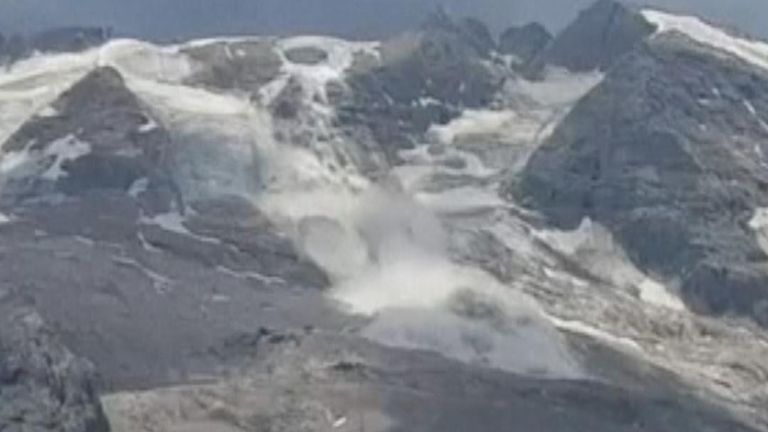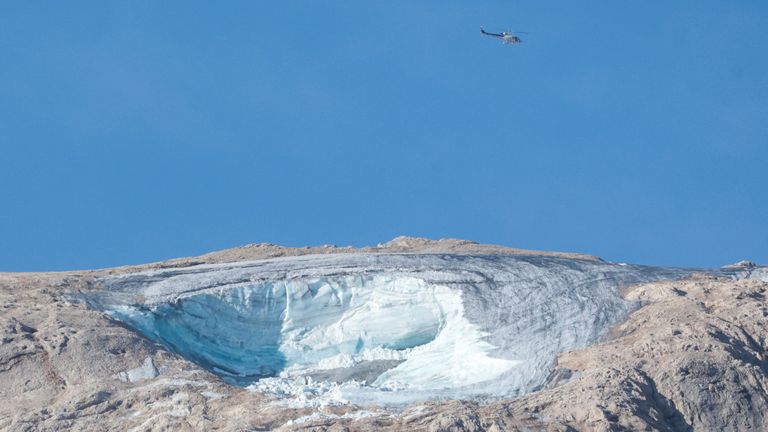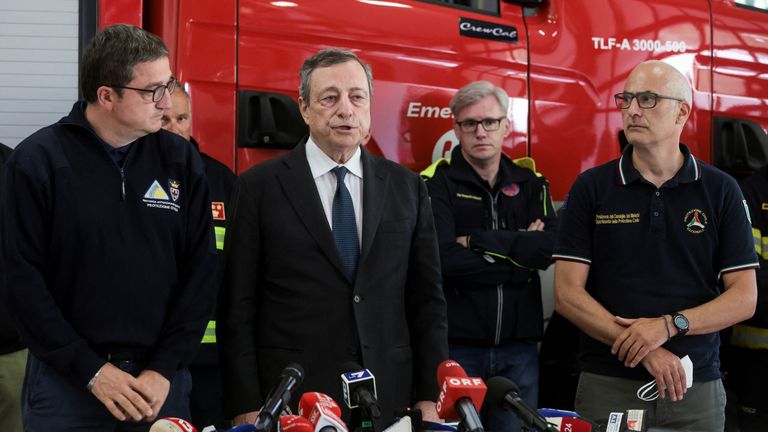Deadly glacier avalanche linked to climate change, says Italian PM
The glacier, in the Marmolada range, is the largest in the Dolomite mountains in northeastern Italy. It has been rapidly melting away over the past decades, with much of its volume gone.
Monday 4 July 2022 17:35, UK
The search for more than a dozen hikers who are still missing a day after a huge chunk of an Alpine glacier in Italy broke off is being hampered by thunderstorms.
Rescuers said conditions downslope from the Marmolada glacier were still too unstable to send back teams of people and dogs to dig into tonnes of debris.
Seven people are now known to have died after the avalanche of ice, snow, and rocks on Sunday afternoon.
Eight others were injured, while drones have been deployed to search for those unaccounted for.
Regional leader, Maurizio Fugatti, said 14 people were missing: 10 Italians, three from the Czech Republic and one from Austria.
Italian Prime Minister Mario Draghi said the avalanche was linked to climate change.
He met some of the victims' families and expressed "the most sincere, affectionate, heartfelt closeness" to them, and demanded action be taken so a similar tragedy does not happen again.
"This is a drama that certainly has some unpredictability," Mr Draghi said, echoing several experts who said an avalanche triggered by a glacier's break-up could not be forecast.
But what happened "certainly depends on environmental deterioration and the climate situation", the premier said.
At least four bodies, brought to a makeshift morgue at an ice rink in Canazei in the Dolomites, have been identified.
RAI said three of those were Italians, including an experienced Alpine guide who was leading a group of hikers.
Another was a hiker whose relatives said had sent a selfie from the slope shortly before the avalanche.
One of the deceased was from the Czech Republic, RAI said.
Temperatures 'absolutely an anomaly'
Veneto regional governor Luca Zaia said some of those hiking in the area on Sunday were roped together as they climbed.
What caused part of the glacier to break off and thunder down the slope at a speed estimated by experts at nearly 200mph is not immediately known.
But the heatwave gripping Italy since May, bringing temperatures unusually high for the start of summer even up in the normally cooler Alps, was being cited as a likely factor.
Upon arrival at an emergency rescue centre in Canazei, Mr Draghi said the collapse was "linked to" climate change.
Jacopo Gabrieli, a polar sciences researcher at Italy's state-run CNR research centre, said the temperatures were "absolutely an anomaly".
Alpine rescuers on Sunday noted that late last week, the temperature on the 3,300-metre high peak had topped 10C (50F), far higher than usual.
The glacier, in the Marmolada range, is the largest in the Dolomite mountains in northeastern Italy. It is popular with skiers in the winter.
But it has been rapidly melting away over the past decades, with much of its volume gone.
Watch the Daily Climate Show at 3.30pm Monday to Friday, and The Climate Show with Tom Heap on Saturday and Sunday at 3.30pm and 7.30pm.
All on Sky News, on the Sky News website and app, on YouTube and Twitter.
The show investigates how global warming is changing our landscape and highlights solutions to the crisis.







